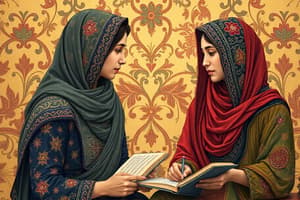Podcast
Questions and Answers
Which of these is NOT a way that Malala describes herself in the text?
Which of these is NOT a way that Malala describes herself in the text?
- A girl who has to stay up late studying for her physics test
- A girl who draws pictures to explain things
- A girl who is afraid of speaking out (correct)
- A girl who hates pasta and likes cupcakes
What is the significance of Malala wearing "one of Benazir Bhutto’s scarves"?
What is the significance of Malala wearing "one of Benazir Bhutto’s scarves"?
- It symbolizes her support for the former Prime Minister's legacy (correct)
- It is a personal fashion choice with no deeper meaning
- It is a way to honor her cultural heritage
- It represents her own political aspirations
What is the central message that Malala conveys in her UN speech?
What is the central message that Malala conveys in her UN speech?
- The role of women in promoting social change
- The importance of education as a means to achieve peace and equality
- The power of one voice to make a difference (correct)
- The need for international cooperation to combat terrorism
Malala's statement "I speak not for myself, but for all girls and boys" suggests that she believes in:
Malala's statement "I speak not for myself, but for all girls and boys" suggests that she believes in:
What does Malala mean when she says "Weakness, fear, and hopelessness died. Strength, power, and courage was born."?
What does Malala mean when she says "Weakness, fear, and hopelessness died. Strength, power, and courage was born."?
What is the most likely reason Malala chose to address the UN?
What is the most likely reason Malala chose to address the UN?
The phrase "Malala Day is not my day" is significant because it signifies:
The phrase "Malala Day is not my day" is significant because it signifies:
What is the underlying theme connecting Malala's personal experiences and her message in the UN speech?
What is the underlying theme connecting Malala's personal experiences and her message in the UN speech?
What is one action that Malala describes her father taking?
What is one action that Malala describes her father taking?
How does Malala perceive her situation after the attack?
How does Malala perceive her situation after the attack?
What do journalists often emphasize in their interviews with Malala?
What do journalists often emphasize in their interviews with Malala?
What specific project did the Malala Fund start in Swat?
What specific project did the Malala Fund start in Swat?
What is Malala's concern regarding her future?
What is Malala's concern regarding her future?
What does Malala believe about children in worse situations than herself?
What does Malala believe about children in worse situations than herself?
What underlying theme frustrates Malala about the journalists' questions?
What underlying theme frustrates Malala about the journalists' questions?
What experience does Malala describe encountering in Jordan?
What experience does Malala describe encountering in Jordan?
What does the father do at the conferences he attends?
What does the father do at the conferences he attends?
How does the mother’s attitude change after the arrival of guests?
How does the mother’s attitude change after the arrival of guests?
What is the significance of the Khushal School to the father?
What is the significance of the Khushal School to the father?
In what way does the writer express anger about people's perceptions of her father?
In what way does the writer express anger about people's perceptions of her father?
What changes has the mother made to her public appearance?
What changes has the mother made to her public appearance?
What does the father cook every morning, and what does it signify?
What does the father cook every morning, and what does it signify?
What is indicated by the phrase 'I was somewhere between life and death'?
What is indicated by the phrase 'I was somewhere between life and death'?
What emotion does the father express when he recalls the days after the attack?
What emotion does the father express when he recalls the days after the attack?
What does the speaker identify as a key aspect of their mission?
What does the speaker identify as a key aspect of their mission?
What feelings does the speaker convey about their experiences in New York compared to Pakistan?
What feelings does the speaker convey about their experiences in New York compared to Pakistan?
Which statement best reflects the speaker's perspective on the impact of violence on their ambitions?
Which statement best reflects the speaker's perspective on the impact of violence on their ambitions?
What significant event took place on the speaker's sixteenth birthday?
What significant event took place on the speaker's sixteenth birthday?
In the context of their discussions with public figures, what was the speaker's stance on American military actions?
In the context of their discussions with public figures, what was the speaker's stance on American military actions?
Which individual did the speaker mention as someone who took their campaign seriously?
Which individual did the speaker mention as someone who took their campaign seriously?
How does the speaker describe their feelings about the people they met in the United States?
How does the speaker describe their feelings about the people they met in the United States?
What influence did the speaker wish to have on the spending priorities of America?
What influence did the speaker wish to have on the spending priorities of America?
What can be inferred as the reason behind the author's ongoing disputes with her brother Khushal?
What can be inferred as the reason behind the author's ongoing disputes with her brother Khushal?
Based on the passage, what is the author's likely reason for being more homesick after talking with Moniba?
Based on the passage, what is the author's likely reason for being more homesick after talking with Moniba?
What is the author's father's primary reason for discouraging her from returning to Pakistan?
What is the author's father's primary reason for discouraging her from returning to Pakistan?
What does the author's use of the phrase “a giant wind suddenly picked them up in Pakistan, blew them across the globe, and set them down here in this foreign place” suggest about her brothers' experience?
What does the author's use of the phrase “a giant wind suddenly picked them up in Pakistan, blew them across the globe, and set them down here in this foreign place” suggest about her brothers' experience?
Which statement best reflects the author's perspective on her fame?
Which statement best reflects the author's perspective on her fame?
How does the author's mother's behavior towards her reflect her feelings about the situation?
How does the author's mother's behavior towards her reflect her feelings about the situation?
Which of the following statements accurately reflects the author's perception of her brothers' view of her?
Which of the following statements accurately reflects the author's perception of her brothers' view of her?
What can be inferred about the author's attitude towards her life in a foreign country?
What can be inferred about the author's attitude towards her life in a foreign country?
Flashcards
Homesickness
Homesickness
The feeling of missing home and longing to return to one's familiar surroundings.
Atal
Atal
Malala's brother who is curious about her fame and doesn't fully understand the impact of her advocacy.
Human Rights Advocate
Human Rights Advocate
A person who strongly advocates for the protection of basic human rights and freedoms.
Free Speech
Free Speech
Signup and view all the flashcards
Advocate
Advocate
Signup and view all the flashcards
Feuding
Feuding
Signup and view all the flashcards
Head of the Taliban
Head of the Taliban
Signup and view all the flashcards
Protective
Protective
Signup and view all the flashcards
Being known as someone's relative
Being known as someone's relative
Signup and view all the flashcards
Speaking out for Peace
Speaking out for Peace
Signup and view all the flashcards
Adapting to a new life
Adapting to a new life
Signup and view all the flashcards
Having a mind of one's own
Having a mind of one's own
Signup and view all the flashcards
Getting angry
Getting angry
Signup and view all the flashcards
Happiness
Happiness
Signup and view all the flashcards
Feeling homesick
Feeling homesick
Signup and view all the flashcards
Having your own agency
Having your own agency
Signup and view all the flashcards
Sadness
Sadness
Signup and view all the flashcards
Second Chance
Second Chance
Signup and view all the flashcards
Fearlessness
Fearlessness
Signup and view all the flashcards
Self-Doubt
Self-Doubt
Signup and view all the flashcards
Domestic Child Labor
Domestic Child Labor
Signup and view all the flashcards
Refugees
Refugees
Signup and view all the flashcards
Right to Education
Right to Education
Signup and view all the flashcards
Using Your Voice
Using Your Voice
Signup and view all the flashcards
Malala's Attack
Malala's Attack
Signup and view all the flashcards
I speak not for myself, but for all girls and boys
I speak not for myself, but for all girls and boys
Signup and view all the flashcards
Education as a Weapon
Education as a Weapon
Signup and view all the flashcards
Speaking Up for Rights
Speaking Up for Rights
Signup and view all the flashcards
Strength in the Face of Adversity
Strength in the Face of Adversity
Signup and view all the flashcards
One Child, One Teacher, One Book, One Pen
One Child, One Teacher, One Book, One Pen
Signup and view all the flashcards
Silence to Thousands of Voices
Silence to Thousands of Voices
Signup and view all the flashcards
Study Notes
The One Thing We All Know
- The author, Malala, reflects on the consistent aspects of her life despite the changing world, such as continuing conflicts with her brother and a persistent desire to return home to Pakistan.
- The author's medical treatment in a foreign location is delaying her return home.
The author's brother, Khushal
- The author reports ongoing disagreements with her brother.
- Disagreements involve trivial things like choosing seating or radio stations.
- Physical altercations are mentioned as well as locked doors.
Family Feuds
- The author and her sister, Moniba, have ongoing conflict, but they maintain a connection through technology
- They engage in long-distance gossip sessions.
- The author notices increasing feelings of homesickness when communicating with friends and family at home.
The Rise of the Taliban
- Fazlullah's growing influence has affected the entire country.
- The author's brothers, while far from home, feel disoriented and uprooted by the upheaval.
- Their father acknowledges the media fuss surrounding the author's campaign, but doesn't understand the reasons behind it.
Malala's Life
- She acknowledges ongoing struggles despite facing a hostile and dangerous environment in her homeland.
- She refuses to be defined by her experience as a victim and maintains hope for the future.
- She realizes one aspect of her life that hasn't changed; her ability to use her voice to make a difference.
The author's father
- He prioritizes her medical treatment above everything else, which is keeping her away from home.
- Her father has taken a greater role in managing chores around the house taking over kitchen duties and duties in caring for other family members.
The media, and fame
- The author's family, particularly her brothers, are confused by the media attention surrounding her.
Studying That Suits You
Use AI to generate personalized quizzes and flashcards to suit your learning preferences.




